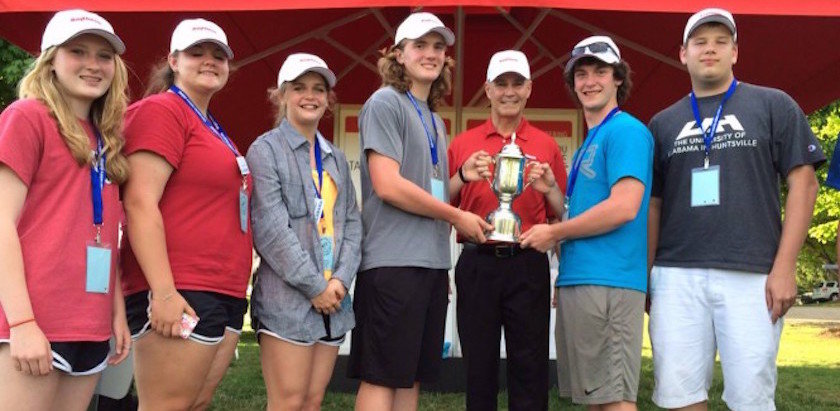
A team of students from Russellville won first place in the world’s largest rocketry competition, earning the right to represent the United States in an international fly-off at the Paris International Airshow in June.
The RCS Engineers Rocketry Team beat out 100 competing teams to claim victory in the 2015 national finals of the Team America Rocketry Challenge (TARC) in Virginia last weekend, according to the Aerospace Industries Association (AIA), a trade group involved in the competition.
“We had high aspirations coming into the finals and it’s incredibly exciting that we performed as well as we did,” said Andrew Heath, captain of the RCS Engineers Rocketry Team. “It just goes to show that anybody can accomplish their goals with enough hard work.”
Aerospace giant Raytheon, a key TARC sponsor, gave a shout-out to the Alabama team in a Facebook message.
“Congratulations to Russellville City School team from Russellville, Alabama, on their victory in the Team America Rocketry Challenge National Finals! We’re sending them to the Paris International Airshow in June to represent the United States in a competition against teams from the United Kingdom and France,” Raytheon said.
‘ROCKETRY TRADITION’
The Russellville City School students topped nearly 700 teams that participated in this year’s TARC competition, which drew participants from 48 states, the District of Columbia, Puerto Rico and the U.S. Virgin Islands, according to a statement from the AIA.
Besides Heath (17), the winning team from Russellville was made up of Christian Ruiz (16), Niles Butts (16), Katie Burns (12), Evan Swinney (17), Emma Studdard (14), and Chelsea Suddith (15). As champions, the Russellville team was awarded more than $20,000 in prizes and funds for their school.
“Alabama is the cradle of the nation’s rocket program and the birthplace of the Saturn V rocket that sent man to the moon, so it is truly wonderful to see this group of young Alabamians continue our innovative rocketry tradition,” said Commerce Secretary Greg Canfield. “This is a very impressive accomplishment, and we all wish them the best of luck at the international fly-off at the Paris Air Show.”
The AIA says the competition is structured to reflect the aerospace industry’s engineering design process. TARC challenged teams to design and build a model rocket that could travel to a height of 800 feet and back within 46 to 48 seconds. Rules required each rocket to carry one raw egg that had to be safely returned to the ground uncracked. Scores were determined by how close the rockets came to the required height and time. Damaged eggs disqualified flights.
But there was more to challenge to the students’ ingenuity and rocket adaptability. The 42 teams that advanced to the second round at the national finals at Great Meadow in the Plains, Virginia, had to meet new scoring parameters, launching their rockets to 775 feet and coming back to earth within 45 to 47 seconds.
Under the scoring system used in TARC, teams were aiming for a perfect score of zero. The RCS Engineers achieved a combined score of 16.16 — less than half of the second place team’s total score.
BRIGHT FUTURE
“The innovation and technical know-how demonstrated by today’s competitors shows us the future of rocket science is very bright,” said Pamela Erickson, vice president of corporate affairs for Raytheon. “Creating supportive environments for students to work together to expand their horizons serves everyone’s future.”
Waltham, Massachusetts-based Raytheon operates a futuristic factory in Huntsville that produces SM-3 and SM-3 missiles using highly automated systems.
Since its inception in 2002, more than 60,000 middle and high school students have participated in TARC. The AIA says the competition is made possible by the generous support of Raytheon, Lockheed Martin Corp., Thales USA, Microsemi Corp. and 23 other industry sponsors.
Don’t miss out! Subscribe today to have Alabama’s leading headlines delivered to your inbox.